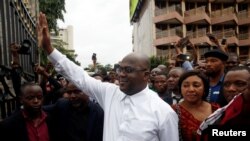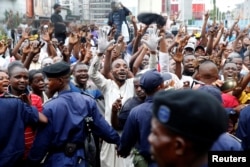Felix Tshisekedi has emerged from his father's shadow to become Congo's next president. For decades that post eluded his father, the venerated opposition politician, Etienne, whose death in 2017 helped catapult his son into the limelight.
The passage of power from father to son is a familiar story in Congo, where President Joseph Kabila took office at age 29 after the assassination of his father, Laurent, in 2001. He stayed on two years beyond his mandate amid delayed elections that finally took place on Dec. 30.
Now Tshisekedi, 55, is taking over after a disputed vote, with his inauguration on Thursday marking troubled Congo's first democratic transfer of power since independence in 1960 from Belgium.
Many Congolese say his surprise victory is one the largely untested opposition leader did not earn.
Runner-up Martin Fayulu on Sunday lost a court challenge to election results despite presenting leaked data from Congo's electoral commission showing he easily won. Fayulu has declared himself the only legitimate president, but Congolese largely have not heeded his call for peaceful protests.
Fayulu and his supporters have accused Kabila of making a backroom deal with Tshisekedi when the ruling party's candidate did poorly in the vote. Fayulu, an opposition lawmaker and businessman who is outspoken about cleaning up Congo's sprawling corruption, has been seen by some as a bigger threat to Kabila and his allies.
Tshisekedi "was somebody who would compromise and somebody they felt they could work with because he wasn't saying he would launch an investigation into Kabila," said Andrew Edward Tchie, research fellow at the International Institute for Strategic Studies.
His presidency will essentially be "a continuation of the regime," Tchie said. Even if Fayulu had been declared the winner "it would have been the same thing," given that Kabila's ruling coalition won a majority of the National Assembly.
Tshisekedi, who was largely quiet after the election, has not addressed the allegation of a secret deal. He told supporters after the court's declaration of his victory that "the Congo that we are going to form will not be a Congo of division, hatred or tribalism. It will be a reconciled Congo, a strong Congo that will be focused on development, peace and security."
Nobody thought the electoral process would be peaceful, Tshisekedi has said, and no one thought an opposition candidate would win.
After division among African leaders over the disputed vote, some have congratulated Tshisekedi and urged Congolese to move on in the interest of stability after decades of rebel-led turmoil that have left millions dead.
Until his surprise victory, Tshisekedi's most notable political act had been briefly supporting Fayulu as the candidate of an opposition coalition last year but then breaking away within a day to pursue the presidency himself.
Tshisekedi, the father of five, quietly built his career in the shadow of his father, taking over Congo's most prominent opposition party only a year after his death.
He had been named the Union for Democracy and Social Progress party's national secretary in 2008, and was elected a national deputy in 2011 to the city of Mbujimayi in Kasai Oriental province. He later won a National Assembly seat and in 2016 became the party's vice secretary.
The party's supporters are nicknamed "the fighters" for their outspoken following. When they speak of Tshisekedi or the UDPS, there is usually mention of his charismatic father.
"Etienne left us the agreement [for Kabila to leave], now Felix is going to be president,'' said one supporter, Jean-Baptiste Lay.
Etienne Tshisekedi's death came at a fragile moment for Congo. He was deeply involved in efforts to persuade Kabila to agree to step down amid sometimes deadly protests over the election delay.
The 84-year-old had formed the country's first opposition party in 1982 against the longtime dictatorship of Mobutu Sese Seko and briefly served several times as prime minister.
Tshisekedi went into exile in 2000 after clashes with Kabila's father, who took power after Mobutu's ouster. He made a triumphant return in 2003 as Joseph Kabila was early in his rule. He lost to Kabila in the 2011 presidential election amid allegations of vote-rigging and declared himself president in protest.
When he died in Belgium, Kabila's government was so wary of the impact on people the return of his body to Congo could cause that until now they have blocked it from coming home.
Felix Tshisekedi, the only one of six sons to enter politics, doesn't have his father's fire, some observers have said. Questions remain about his abilities and qualifications. Some Belgian media have questioned the veracity of his diploma, but Congolese law says a candidate can either submit a diploma or serve a certain amount of time as a politician to qualify to run for president.
As Congo's incoming leader inherits the troubled country, he will look to his father's legacy. One of his first things Tshisekedi will do once sworn in, a spokesman said, is finally allow his father's body to come home for burial.







